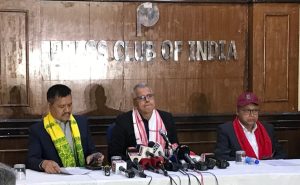The Indian government has signed an agreement with the pro-talks faction of the banned United Liberation Front of Asom (ULFA) in New Delhi, capping a long process that began early in 2011 after ULFA Chairman Arabinda Rajkhowa and some other senior functionaries were apprehended in Bangladesh and repatriated to India.
Under the agreement inked on December 29, 2023, the outfit has committed to disbanding itself, surrendering its weapons and shunning violence. It has agreed to join the democratic process within a stipulated time frame. Each of the 750 functionaries lodged in nine designated camps across the state will be offered a financial grant.
The chief of ULFA’s anti-talks faction Paresh Baruah has slammed the agreement and described it as “shameful.” The anti-talks faction still has several camps in the Naga-inhabited region of Myanmar contiguous to the twin Indian states of Nagaland and Arunachal Pradesh.
Baruah said he was willing to engage with the Indian government if Assam’s sovereignty is included as the “core issue” in the negotiations. So far, the government has not responded but there are indications that Baruah’s demands will not be accepted.
Under the agreement, the Indian government has committed to putting in place “effective measures” to prevent illegal immigrants from enrolling in the voters’ lists.
The government also agreed to reverify the National Register of Citizens (NRC) in Assam if considered necessary after the judgment by the Supreme Court that had mandated the exercise. It was a key demand of the ULFA (Pro-Talks) faction as well as of civil society groups in Assam, who had opposed it over the many anomalies in compiling the list of citizens.
The Bharatiya Janata Party (BJP)-led government in Assam had also disapproved of the NRC and pledged to rectify it during the state assembly elections of 2021. An affidavit was submitted in the Gauhati High Court by former NRC coordinator Hitesh Deva Sarma, underscoring the flaws in the list.
Linked to the NRC case is another crucial petition in the apex court by a conglomerate of civil society groups in Assam, challenging the cut-off year for citizenship in the state. The petitions have argued that the cut-off year for the state must be 1950 at par with the rest of the country instead of 1971 currently for Assam. The hearing has been completed and the court has reserved its judgment on the case. The NRC was compiled with 1971 as the cut-off year for citizenship.
The rationale of the demand by the pro-talks ULFA faction on NRC was to check the demographic onslaught in Assam by illegal immigrants from Bangladesh.
In addition, they also demanded that Scheduled Tribe (ST) status, reservation of seats in elected bodies, and land rights be granted to six indigenous communities of the state, similar to provisions for tribals in the hill states neighboring Assam. The demands for reservation of seats in the elected bodies as well as land rights similar to the neighboring hill states of Assam were rejected by the government.
However, the government has agreed to “expedite the process” for granting the ST status to the six indigenous communities for which a bill was tabled by the government in the upper house of Parliament (Rajya Sabha) in 2019.
The ongoing anti-encroachment drive against the illegal occupation of government land, including reserve forests and riverine islands will be continued and satellite images will be examined to identify areas of encroachment. All land holdings are to be digitalized within three years and steps will be taken to prevent the shrinkage of agricultural land. A slew of projects in the state for development, tourism, sports, prevention of river bank erosion, and cultural promotion have been approved.
A section of Assam’s civil society groups and political parties have criticized the agreement. Prabrajan Virodhi Manch, which has been at the vanguard of the demand for land rights for indigenous communities, said that the pact was nothing but a “summing of the ongoing schemes and projects in the state.”
Assam’s opposition parties have described the accord as a “political gimmick” ahead of the general elections next year.
India will vote in general elections in a few months. This was certainly a key contributing factor that prompted BJP-led governments at the center and in Assam to finalize the accord.
Since 1992, there have been as many as three initiatives to convince the ULFA to accept a negotiated settlement with the government. The efforts were derailed owing to different circumstances on every occasion. Most importantly, ULFA was assured of sanctuary in Bangladesh till 2009, making it safe for its leadership to continue with its campaign for Assam’s independence from India in that period
That changed in 2009, when the Sheikh Hasina-led Awami League came to power in Bangladesh. More mindful of India’s security interests than the Bangladesh Nationalist Party (BNP), the AL government began cracking down on ULFA in Bangladesh.
Also, in 2009, ULFA split, and Paresh Baruah departed from Bangladesh to another country. Subsequently, several ULFA leaders, including Rajkhowa were apprehended from different parts of Bangladesh and handed over to India. These leaders joined hands with the overground ULFA functionaries who were already in Assam to begin the peace process with the Indian government almost a year later with the submission of a charter of demands.
That process has culminated with the agreement signed on December 29, 2023.

































